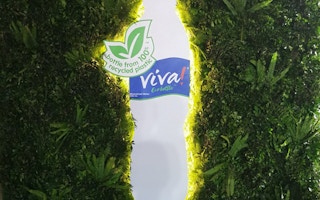A big stick in the wheel for the circular economy of plastics in Asia is the perception among consumer goods companies that using recycled plastic is bad for their brands, experts suggested at a United Nations-backed event today.
To continue reading, subscribe to Eco‑Business.
There's something for everyone. We offer a range of subscription plans.
- Access our stories and receive our Insights Weekly newsletter with the free EB Member plan.
- Unlock unlimited access to our content and archive with EB Circle.
- Publish your content with EB Premium.
Asian consumers regard recycled plastic as inferior and unclean, so companies don’t want to use it in their products, experts said at the Plasticity event, part of the SEA of Solutions week, at the UN Conference Centre in Bangkok on Tuesday.
“Are brands in Asia afraid to use recycled material in their products? Is there a fear that recycled plastic is seen as second grade and not new [by consumers]?,” said Doug Woodring, founder of Hong Kong-based marine plastic solutions group Ocean Recovery Alliance, on a panel on solutions to the plastics crisis in Southeast Asia.
The answer would appear to be yes, they are.
“
Asian consumers regard clear plastic as good, and blemished or offcolour plastic as bad. But it’s the same content.
Jonathan F. Co, sales and marketing manager, Sentinel Plastic Manufacturing Corp.
Speaking to Eco-Business on the sidelines of Plasticity, Richard Jones, senior vice president, communications and sustainability, for Indorama Ventures, one of Asia’s biggest manufacturers and recyclers of plastic, said his company struggles to sell recycled plastic in Asian markets such as Thailand, where the company is headquartered, because consumer goods companies regard recycled plastic as “dirty”.
One of the few markets in the region Indorama Ventures can find for recycled plastic is Australia, where there is less of a stigma about using recycled material, Jones said.
Recycled plastic is typically grey or blueish, and brands that produce products such as laundry detergent want white packaging to market the cleaning properties of their products, noted Trish Hyde, managing director of circular economy consultancy, The Plastic Circle, and a co-organiser of Plasticity.
Jonathan F. Co, sales and marketing manager for Manila-based plastic manufacturer Sentinel, told Eco-Business that companies in Asia are reluctant to switch to recycled packaging, because they worry that they’ll be the last competitor to change and will lose market share as a result.
“Clear plastic has the perception of being premium—but it’s the same content as recycled plastic, which is not harmful to health,” he said, adding that recycled plastic, with the exception of polyethylene terephthalate (PET) used to make plastic bottles, is usually cheaper for brands to buy than virgin plastic.
“The problem comes down to managing that uncertainty [over recycled plastic among consumers], managing that fear,” he said.
Consumer goods companies, which are the world’s biggest plastic polluters according to global litter audits, have a responsibility to communicate the safety and cleanliness of recycled plastic to consumers, Co said.
Belinda Ford, director of public affairs, communications and sustainability, Southeast Asia, for Coca-Cola, which regularly tops the rankings of the world’s plastic polluters, said at Plasticity that consumers trust companies like Coke to guide them on sustainable product choices.
“Consumers do trust big brands, and we have stringent safety standards [for packaging],” said Ford, adding that Coke’s safety standards are often more rigorous than regulators demand.
Coca-Cola, which recently announced new targets to work towards 100 per cent recycled or renewable materials in all of its plastic bottles, is set to launch its first bottle made entirely from recycled plastic in the Philippines, bottled water brand Viva!. The product has yet to go on sale in the archipelago.
Ford said: “We are communicating that it’s [bottled water brand Viva!] made from recycled material. There is a role for companies to play [to communicate that recycled plastic poses no threat to human health], and it has to be done hand in hand with policymakers.”
Coca-Cola’s recycled bottled water launch will come nine months after rival Danone launched a 100 per cent recycled water bottle in Indonesia.










